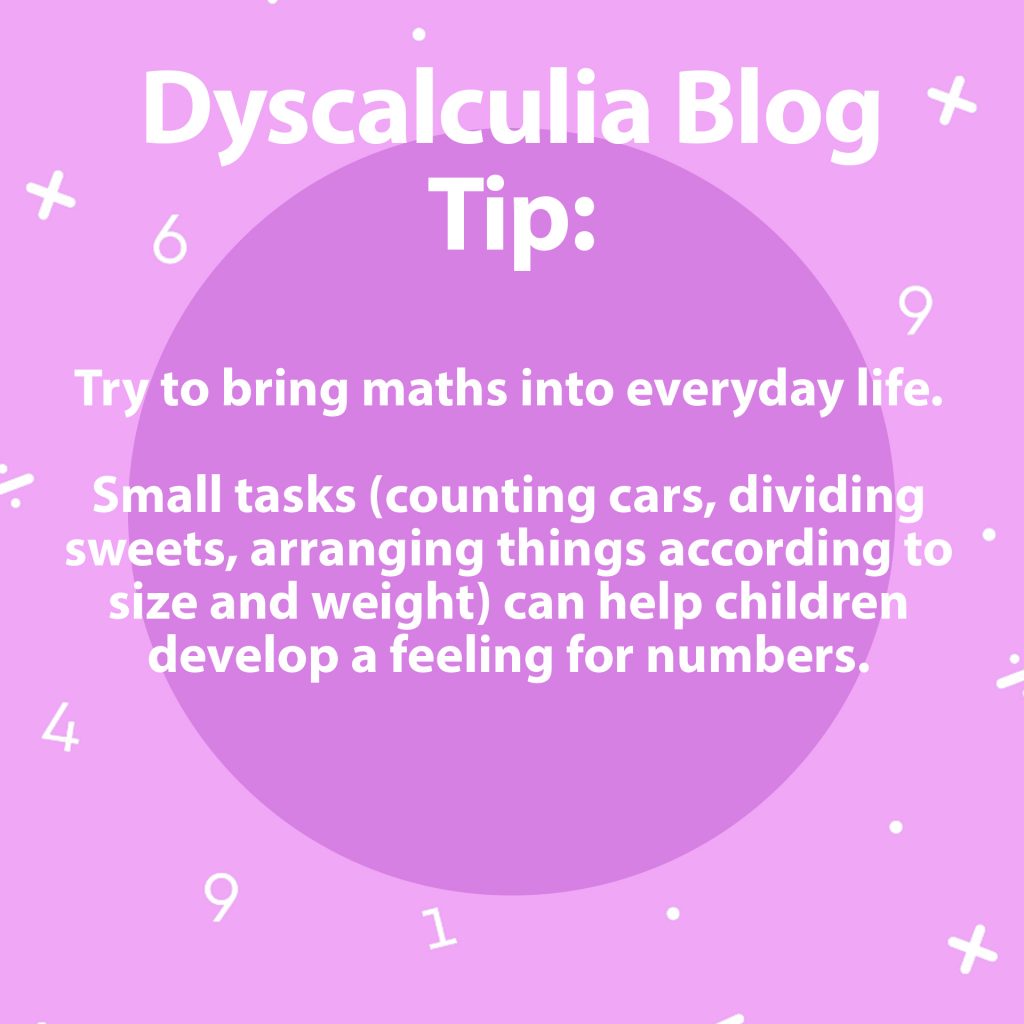Are you wondering why your child struggles with numbers and finds it challenging to solve seemingly simple tasks?

Understanding Dyscalculia
Dyscalculia is usually perceived as a specific learning difference in mathematics or, more appropriately, arithmetic. In isolated dyscalculia, there are no deficits in reading or writing. Dyscalculia is classified under WHO ICD-10, a classification system for diseases and mental disorders, as:
The American Psychiatric Association’s DSM-IV (Diagnostic and Statistical Manual of Mental Disorders) describes dyscalculia as:
“A specific learning disorder that is characterised by impairments in learning basic

Signs and Symptoms
With Dyscalculia the computational difficulties can appear from the very beginning of learning numbers at school. However, if the child has a generally high level of learning and achievement, deficiencies in arithmetic can only be noticed at a later stage, namely when school demands increase. The first signs of dyscalculia can already be seen in preschool age. The understanding of numbers and quantities, counting skills, and simple addition and subtraction tasks are difficult. However, since
Children affected by dyscalculia are more prone to mental health problems such as depressive or psychosomatic symptoms. Some children are becoming more and more withdrawn because of school difficulties, others are more prone to aggressive behaviour. In addition to dyscalculia, your child may also experience dyslexia or an attention deficit disorder (ADD) with or without additional hyperactivity disorder (ADHD).
Frequency and Causes
According to international studies, about 3 to 8% of all children and adolescents suffer from dyscalculia. It has not yet been clarified whether girls or boys are affected more frequently. Some studies have found no difference in this regard, while others show that girls are more likely to suffer from dyscalculia. The causes of dyscalculia are still not known today. However, it is believed that there are several factors that influence computational skills, such as genetic, neuroscience, and cognitive factors.
In addition, the child’s relationship with parents, peers, teachers, financial security and way of parenting can compound existing computational issues. It also matters whether the child has deficits in other areas, such as ADHD or mental health problems.

Activities in the Brain
What happens inside a brain with dyscalculia? Using fMRI and EEG studies, scientists have found that we have a kind of innate number sense in the parietal lobe of our brain. This serves the quantity comprehension and thus the development of the later calculation abilities. Dyscalculics show significantly less activation in this region. This is related to the fact that children with dyscalculia, even with increasing age, still mainly work with the frontal lobe, which is responsible for learning new content.
Effects of Dyscalculia
Contrary to widespread opinion, you do not grow out of dyscalculia. Studies have shown that dyscalculics leave school early and are less likely to acquire a vocational qualification than peers without dyscalculia. Furthermore, their everyday lives are heavily affected, as they can have difficulties using money or reading clocks.
However, if dyscalculia is diagnosed early and the therapy is appropriate, the prognosis is good, and arithmetic can still be learned later.

Assessment and Diagnosis
A diagnosis should be made as early as possible and by experienced specialists. The Dyslexia Centre in London or the British Dyslexia Association, for example, recommend professional Educational Psychologists for assessments and diagnosis.
Treatment after Diagnosis
The earlier an intervention is started, the better the chances of development. Highly recommended are individualised therapies by trained specialists because the dyscalculia is in focus, but the entire situation, such as depression or psychosomatic symptoms. This is the best way to control the difficulties of computation and mental health difficulties in the long term. The first attempt is to give children access to understanding numbers and quantities.
Only in the second step simple arithmetic operations are then discussed. Funding programs must be long-term, as dyscalculia can not be treated in a few weeks. In addition, one to one therapy is more effective than group therapy or in class. Instead of abruptly stopping treatment, it is advisable to increase the duration between sessions to eliminate it gradually.
We would also recommend using software such as Calcularis, which has proven efficacy for dyscalculia through numerous studies. It is designed to adapt to the user’s needs, and its recommended use is only 20 minutes 3 times a week. This minimises stress and ensures it works well in and around other commitments.
However, far down the path of dyscalculia, whether at the beginning of identifying or you are already challenging your difficulties with numbers, always remember that others are on the same journey and can help you. You can find these people in our Dyscalculia Support Group on Facebook – Join here.

Pingback: Tip for dyscalculia in daily life - Dyscalculia HeadlinesDyscalculia Headlines
This is so helpful. Thank you.
Thankful I found your blog! I have a 13 yr old daughter with Dyscalculia. We are struggling to find a school that can support her in math. She is an honor roll student, loves art and would like to go to a college for art. She is concerned colleges won’t accept her because of her Dyscalculia.
Thanks! 🙂
It can be difficult to find schools that have the support needed for some with dyscalculia.
I would recommend joining our Dyscalculia Support Group on Facebook if you can as it’s full of professionals, teachers, parents and adults with dyscalculia who are full of amazing tips on how they have approached their dyscalculia and I think they could give the best advice on getting into colleges. 🙂
It is also worth looking at the software from Dybuster – here https://dybuster.com – like Calcularis, as it promotes the development and coordination of areas of the brain responsible for processing numbers.
I was diagnosed with dyslexia/add. At 50 .My whole life I have been struggling .Ive tryed college 7 Times.The last time I tried being aware of it I did well but I struggle everyday with daily living tasks which are chronic.I think I may have dyscalcula instead.Does dyscalcula affect your ability to order your speech,writing,daily living habits thought, and emotions?
Hi Susan,
There still is not enough research on Dyscalculia especially related to the affect on daily life. What we do know is that it shares something common to those with dyslexia and that is difficulties with working memory, which can have an affect on order of speech and can make daily life quite frustrating. I myself struggle with similar things and have read a few recent articles on ADD and ADHD, which went into detail explaining the daily living habits, thoughts and difficulties with emotions. Would you like me to find those articles again? I was surprised to find how fitting the description was to my chronic struggles.
James
Heya. Your very best bet is to get a professional assessment done. This is the only sure way in order to know for sure whether or not you have it. There is a place in London that conducts such assessments. Or you can alternatively search for a educational psychologist online. Get tips and tailored recommendations. Good luck. Make sure to read the evaluation report carefully.
This is to determine how to proceed further along the diagnosis pathway. Compare the costs and make some brief summary notes on finding a educational psychologist. They are out there. But you have to know where to look to get one.